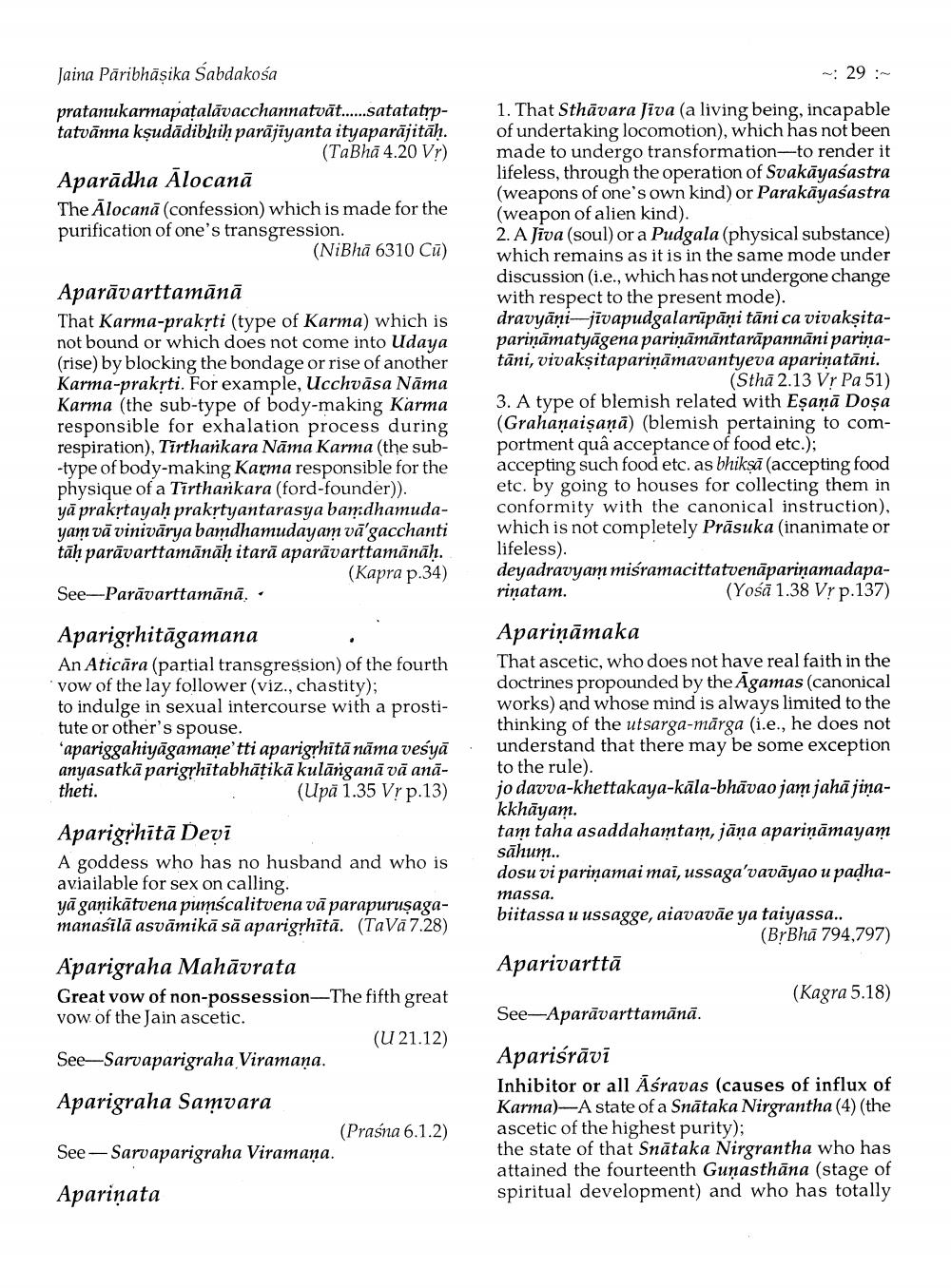________________
29:
Jaina Pāribhāșika Sabdakośa pratanukarmapatalāvacchannatvät......satatatrptatvānna kşudādibhih parājīyanta ityaparăjitā”.
(TaBhā 4.20 Vr) Aparādha Alocanā The Ālocană (confession) which is made for the purification of one's transgression.
(NiBhā 6310 Cū)
Aparāvarttamānā That Karma-praksti (type of Karma) which is not bound or which does not come into Udaya (rise) by blocking the bondage or rise of another Karma-prakrti. For example, cchvāsa Nāma Karma (the sub-type of body-making Karma responsible for exhalation process during respiration), Tirtharikara Nāma Karma (the sub-type of body-making Karma responsible for the physique of a Tirtharkara (ford-founder)). yā prakrtayah prakrtyantarasya bamdhamudayam vā vinivärya bamdhamudayam vā'gacchanti tāḥ parāvarttamānāh itarā aparāvarttamānāḥ.
(Kapra p.34) See-Parāvarttamānā,
1. That Sthāvara Jiva (a living being, incapable of undertaking locomotion), which has not been made to undergo transformation--to render it lifeless, through the operation of Svakāyasastra (weapons of one's own kind) or Parakayaśastra (weapon of alien kind). 2. A Jiva (soul) or a Pudgala (physical substance) which remains as it is in the same mode under discussion (i.e., which has not undergone change with respect to the present mode). dravyāṇi-jīvapudgalarūpāņi tāni ca vivakṣitapariņāmatyāgena pariņāmāntarāpannāni pariņatāni, vivaksitapariņāmavantyeva aparinatāni.
(Sthā 2.13 Vr Pa 51) 3. A type of blemish related with Eşaņā Dosa (Grahaņaişaņā) (blemish pertaining to comportment quâ acceptance of food etc.); accepting such food etc. as bhikṣā (accepting food etc. by going to houses for collecting them in conformity with the canonical instruction), which is not completely Prāsuka (inanimate or lifeless). deyadravyam miśramacittatvenāpariņamadaparinatam.
(Yośā 1.38 Vr p.137)
Aparigrhitāgamana An Aticāra (partial transgression) of the fourth vow of the lay follower (viz., chastity); to indulge in sexual intercourse with a prostitute or other's spouse. 'apariggahiyāgamaņe'tti aparigrhitā nāma veśyā. anyasatkā parigrhitabhātikā kulārganā vā anātheti.
(Upā 1.35 V; p.13)
Aparigrhītā Devi A goddess who has no husband and who is aviailable for sex on calling. yā ganikātvena pumścalitvena vā parapuruşagamanasilā asvāmikā sā aparigrhitā. (Tavā 7.28)
Apariņāmaka That ascetic, who does not have real faith in the doctrines propounded by the Āgamas (canonical works) and whose mind is always limited to the thinking of the utsarga-mărga (i.e., he does not understand that there may be some exception to the rule). jo davva-khettakaya-kāla-bhāvao jam jahā jinakkhāgam. tam taha asaddahamtam, jāņa apariņāmayam sāhum.. dosu vi pariņamai mai, ussaga'vavāyao u padhamassa. biitassa u ussagge, aiavavāe ya taiyassa..
(BrBhā 794,797) Aparivarttā
(Kagra 5.18) See-Aparāvarttamānā.
Aparigraha Mahāvrata Great vow of non-possession-The fifth great vow of the Jain ascetic.
(U 21.12) See-Sarvaparigraha Viramaņa.
Aparigraha Samvara
(Prasna 6.1.2) See - Sarvaparigraha Viramaņa.
Aparisrāvi Inhibitor or all Āśravas (causes of influx of Karma)--A state of a Snātaka Nirgrantha (4) (the ascetic of the highest purity); the state of that Snātaka Nirgrantha who has attained the fourteenth Gunasthāna (stage of spiritual development) and who has totally
Apariņata




